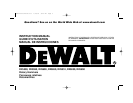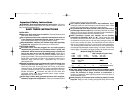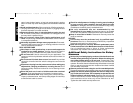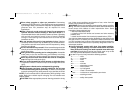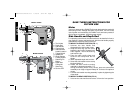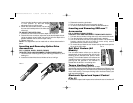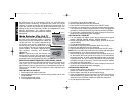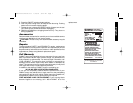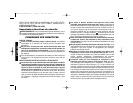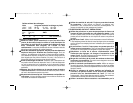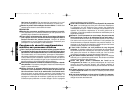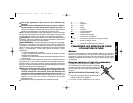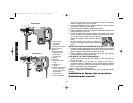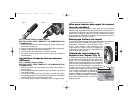
2
Check for misalignment or binding of moving parts, breakage
of parts, and any other condition that may affect the tools
operation. If damaged, have the tool serviced before using. Many
accidents are caused by poorly maintained tools.
Use only accessories that are recommended by the
manufacturer for your model. Accessories that may be suitable
for one tool, may become hazardous when used on another tool.
Keep air vents clear of debris. Reduced air flow may cause the
motor to overheat.
SERVICE
Tool service must be performed only by qualified repair
personnel. Service or maintenance performed by unqualified
personnel could result in a risk of injury.
When servicing a tool, use only identical replacement parts.
Follow instructions in the Maintenance section of this manual.
Use of unauthorized parts or failure to follow maintenance
instructions may create a risk of electric shock or injury.
Additional Safety Instructions for Rotary
Hammers
Hold tool by insulated gripping surfaces (side handle and rear
handles) when performing an operation where the cutting tool
may contact hidden wiring or its own cord. Contact with a “live”
wire will make exposed metal parts of the tool “live” and shock the
operator. Be certain that the material being drilled does not conceal
elctric or gas service and that their locations have been verified
with the untility companies.
Wear ear protectors when using the tool for extended periods.
Prolonged exposure to high intensity noise can cause hearing loss.
Always use the side handle supplied with the tool. Keep a firm
grip on the tool at all times. Do not attempt to operate this tool
without holding it with both hands. Operating this tool with one
hand will result in loss of control. Breaking through or encountering
hard materials such as re-bar may be be hazardous as well.
Tighten the side handle securely before use.
English
parts. Loose clothes, jewelry, or long hair can be caught in moving
parts. Air vents may cover moving parts and should be avoided as
well.
Avoid accidental starting. Be sure switch is off before plugging in.
Carrying tools with your finger on the switch or plugging in tools
that have the switch on invites accidents.
Remove adjusting keys or wrenches before turning the tool
on. A wrench or a key that is left attached to a rotating part of the
tool may result in personal injury.
Do not overreach. Keep proper footing and balance at all
times. Proper footing and balance enables better control of the tool
in unexpected situations.
Use safety equipment. Always wear eye protection. Dust mask,
non-skid safety shoes, hard hat, or hearing protection must be
used for appropriate conditions.
TOOL USE AND CARE
Use clamps or other practical way to secure and support the
workpiece to a stable platform. Holding the work by hand or
against your body is unstable and may lead to loss of control.
Do not force tool. Use the correct tool for your application. The
correct tool will do the job better and safer at the rate for which it is
designed.
Do not use tool if switch does not turn it on or off. Any tool that
cannot be controlled with the switch is dangerous and must be
repaired.
Disconnect the plug from the power source before making any
adjustments, changing accessories, or storing the tool. Such
preventive safety measures reduce the risk of starting the tool
accidentally.
Store idle tools out of reach of children and other untrained
persons. Tools are dangerous in the hands of untrained users.
Maintain tools with care. Keep cutting tools sharp and clean.
Properly maintained tools, with sharp cutting edges are less likely
to bind and are easier to control.
582429-00/D25500 etc 1/29/03 9:29 AM Page 2




